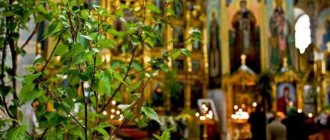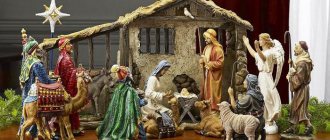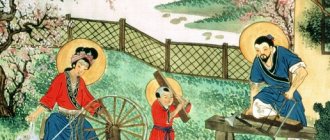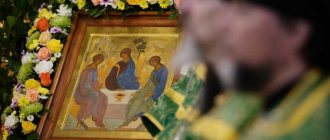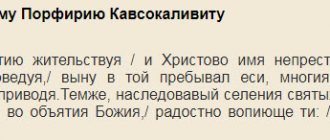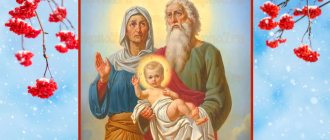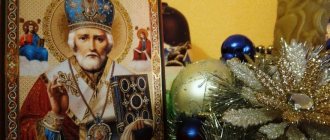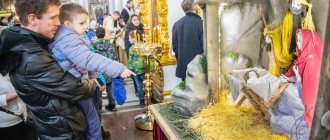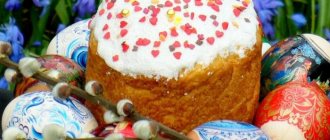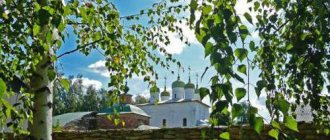Mid-Pentecost is a moving feast of the Lord, which always falls on Wednesday of the 4th week after Easter and has 7 days of after-feast. In a spiritual sense, Midnight seems to unite the two greatest Christian holidays - Easter and Trinity, since this day is exactly located between them and falls exactly in the middle of Holy Pentecost.
Pre-sexuality. history of the holiday
Midnight of Holy Pentecost is one of the oldest Christian holidays. Until the occupation of Constantinople by the Turks in 1453, the feast of the Midsummer was one of the holidays of the Cathedral of St. Sophia - the former patriarchal Orthodox cathedral of Constantinople, once the largest Christian church in the world.
At the liturgy on the day of the Midsummer, the Gospel is read about how Christ came to Jerusalem on the Feast of Tabernacles, which was established to commemorate the forty-year wandering of the Israelites in the desert, when they lived in tents, or in Slavic in booths. During the celebration of Tabernacles, Jews built huts from palm and myrtle branches.
The following should be noted about the festivals celebrated by the Jews. There were three of them: one was the Easter holiday, which they celebrated in memory of the exit from Egypt, and it was their first (main). Another holiday was Pentecost, which they celebrated in memory of deliverance from disasters in the desert and entry into the Promised Land. Then they ate the fruits of the grain for the first time, which is why on this holiday they brought ears of grain as firstfruits.
The third holiday was the setting up of tabernacles, which they celebrated in gratitude for the collection of fruits, according to the Roman calendar in the month of September. Then they thanked the Lord for having gathered all the fruits. That's why they built tabernacles or tents and had fun, living as if in a field. Some say that some of David’s psalms (80 and 83), which have the inscription: “about the sharpeners,” were composed by David specifically for this holiday. Then they filled their grapevines, picking grapes, and, giving thanks for them, used these psalms and others that serve as an expression of gratitude, for example, the eighth psalm. For in it the prophet also mentions the blessings given to man by God.
These holidays had another meaning. Easter meant our transition from unbelief to faith, Pentecost meant our entry into the Church, as if into another promised land, in which we also eat bread, partaking of the Divine Mysteries. The erection of tabernacles meant the Resurrection, when all the fruits of our deeds will be gathered, and our huts (bodies), destroyed by death, will rise again [].
Puberty
Names of the day
rus. Prepalavinyo, Plavenya, Praplavenje[8], South-Russian. Right environment
[9]; Belor. Prapalavenne, PerapalaŞnaya serada[10], Gradavaya, Gramavaya, Palavenskaya serada, Seradaponitsa[11]; Ukrainian Rakhman's Great Day, Recession, The Middle is Right[12]; Bulgarian Rusal Den, Rusal Wednesday[13].
Traditions
I. Trutnev
. Procession for the blessing of water in the village, 1858
Ethnographers have repeatedly noted that the Midwife holiday is one of those “the true meaning of which is almost completely incomprehensible to the people.” The peasants interpreted symbolism and church provisions in their own way, timed to coincide with the holiday those actions that were believed to promote the growth of herbs and grains, the health of people and livestock[14].
On this day, rivers and lakes were blessed[15]. “They drank this water when it was bad, when they got sick. The brute is out of sight, then they go after the woman. She turns the sieve over and pours holy water on it, and he (the cattle) gets all excited and gets tired (gets up)”[8]. It was believed that the sacred power of water increased if special conditions and prohibitions were observed when collecting it and transferring it to the house. The first of these requirements was to walk on water in the early morning before sunrise. The water that was collected before everyone else was highly valued; it was called nepochataya (Ukrainian nepochata, Russian nepochata). When collecting water, it was forbidden to pour water from the bucket or scoop it up a second time; complete silence should be observed when transferring it into the house (Russian mute water). They washed their homes with this water, gave water to the sick, sprinkled it on livestock, beehives, outbuildings, and used it for fortune-telling; a vessel with water was buried in a field, in a vineyard, placed in the foundation of a house under construction, etc.[16]
During the blessing of water on this day, they doused each other with water[12]. In Podolia it was believed that if you pour water on a witch on this day, she will not be able to hold back the rains and the summer will be fruitful[12]. Usually, a prayer service was served at Midsummer during a drought[17].
We went to the forest to get grass. They made scrambled eggs in the forest (see Cooking).
In the village of Rostosh, Voronezh region, they “begged for the trigger” at “Praplavenye.” Women gathered and dressed up in kokoshniks. One woman prepared the food. The men used a plow to make a circle in the ground, and in it was a cross. In it, the girls “puffed themselves up,” danced and sang. This was done on the “planta” (square, wide street). We walked around the plant with a harmonica[18].
In Siberia they said about this day: “The Mother of God sailed on a stone” or “The Virgin Mary sailed on a holy piece of ice”[15].
In Belarus, the people gave their explanation for the day: “On this day, Jesus Christ swam and swam across the sea. From this day you are allowed to swim until Ilya (July 20).” At Midsummer it was advised to plant onions so that they would not be too bitter. They said that wild birds guard their nests on this day, and therefore they can be easily caught. There was a belief that if you dry your clothes in the “Perapalauna Serad”, which was also called dry, moths will disappear[10].
In Bulgaria, there is a belief that on Midnight Wednesday (25 days after Easter), which is popularly called “Rusal Wednesday,” mermaids “get ready for the journey,” so women did not spin, weave, sew, or similar activities for the sake of health. According to legend, mermaids come to “Spasovden” (Ascension). In the Bulgarian village of Valya-Perzhey (Moldova) they believed that on this day - here it is also called “Chernata sryada” - “mermen” (or “mermaids”) come; wormwood was blessed in the church; the women are going to “meet” them at a meal with Lenten dishes and wine, in which they put wormwood[13].
Sayings and signs
- If the water is shallow at mid-season, then there will be no spill (Perm)[19].
- At midnight, the Mother of God swam across the Volga (Volga region)[19].
- Midsummer, right Wednesday - Rokhman Great Day (Ukrainian)[9].
Mid-Pentecost. Divine service
The earliest liturgical texts dedicated to the Epiphany date back to the 5th century (author - Anatoly of Constantinople). Subsequently, hymns for this holiday were written by St. John of Damascus (8th century), as well as St. Theophan the Confessor (IX century) and St. Andrei Kritsky (VII century) - the authors of the festive canons that are part of the Tsvetnaya Triodion. Midsummer has its own honor in the liturgy and is celebrated for 8 days - the holiday falls on Wednesday of the 5th week of Easter.
In liturgical verses and canons for Midsummer, life-giving water is most often mentioned, with which the Lord has to drink the souls of the faithful. This corresponds to the Gospel narrative, dedicated to the description of remembered events, where the Lord Himself testifies of Himself:
If anyone is thirsty, come to Me and drink; Whoever believes in Me, as the Scripture says, out of his belly will flow rivers of living water (John 7:37-38).
Bl. Theophylact of Bulgaria explains these lines as follows:
In a figurative sense, He calls the heart the womb, just like David: “And Your law is in my heart” (Ps. 39:9). He said that “rivers” of living water would flow, not a river. This indicates the abundance and generosity of the grace of the Spirit. For the Spirit is such that in whose soul it enters and establishes itself in it, He causes it to flow more abundantly than any source. Just as rivers flow from a believer, according to the Scripture, anyone can recognize this when they pay attention to the language of Peter, the swiftness of Paul and the wisdom of Stephen. Nothing stopped their words, but they carried everyone along with them, like some rivers, with their unstoppable flow [].
Library of the Russian Faith Canon of Mid-Pentecost →
Read online
The Sunday services for the Paralytic and the Samaritan, with which the feast of Midnight is closely connected, as well as the last week before Easter for the Blind, are directly related to the miracles that were performed at water sources. The paralytic was healed in the font; The Samaritan woman found spiritual rebirth at the well of water; the blind man received his sight after washing himself in the spring of Siloam, sacred to the Jews: the word “Siloam” itself means “sent,” which symbolically speaks of the coming of the Messiah, whom the Father sends to save the world. Siloam itself was a small reservoir, fed by a stream of water flowing from under the temple mount. During the Feast of Tabernacles, the priests performed a special ritual: here they left the Jerusalem temple to the source of Siloam, collected water from there into a golden vessel and brought it to the temple, where the high priest poured it out in front of the altar. Thus, the healing effect of water sources was a prototype of saving Baptism, which frees a person from sinful blindness and paralysis, when a person is truly “born again” and receives the gifts of the Holy Spirit. We read about this in Chrysostom, in the word about the Paralytic:
If anyone is blind in mind, or lame with unbelief, or dry with many iniquities and despair, or weakened by heretical teachings, the waters of baptism make everyone healthy. She receives many fonts, heals only one, and not always, but only in the summer: and the baptismal font revives and heals all days. Even if all people come to baptism, God’s grace will not diminish, but will give everyone healing from sinful ailments. We speak about the Lord’s grace when he came to the sheep font and saw the man relaxed [].
Troparion for the holiday:
Halfway through the holiday, my soul is thirsty for the blessing of fresh water2. He cried out to everyone, let him come to me and sing, and the 3rd source of life, glory to you.
Kontakion for the holiday:
To the holiday of the lawful half-time, the creator of all things, to the upcoming heralds. Come and3 get some water without cmRtiz. At the same time, we fall down and cry out truly, grant us your generosity, you are the source of our belly.
Mid-Pentecost: what the Savior spoke about on the Feast of Tabernacles
Mid-Pentecost is one of the Lord's small feasts. It is celebrated by the Orthodox Church on Wednesday of the fourth week of Easter and lasts eight days (until celebrated on Wednesday of the fifth week of Easter). The name suggests that exactly half the way from Easter to Trinity has been completed. Why is it so important for us to celebrate this moment with a special holiday?
The Feast of the Midsummer was established no later than the 5th century. and was widespread in both the East and West of the Christian world. The teachings on Mid-Pentecost, which are attributed to St., have reached our time. John Chrysostom, but their authenticity is questioned. The first undoubted evidence of the antiquity of the holiday should be considered the “Sermon on Mid-Pentecost” by St. Peter Chrysologos (Golden-Speaker). St. Peter was consecrated around 433 as bishop of Ravenna (Italy) and gained fame as a brilliant church speaker and preacher. “The true Christian mind,” says St. Peter, “will never be carried away by the thought of arguing about holidays, which have a solid basis in paternal tradition, ... but wants to talk about them with due respect and speak about them only with respect.” From this it follows that in his time the feast of Mid-Pentecost had long been known in the Church. The liturgical texts of the holiday also bear the stamp of deep antiquity. So, for example, the first canon of Matins of Midnight was compiled by St. Theophan the Inscribed (+850), and the second canon - St. Andrew of Crete (about 660-740), author of the Great Penitential Canon. The celebration is based on the memory of the appearance and preaching of the Savior in the Jerusalem Temple on the Feast of Tabernacles (Sukkot). According to the instructions of the Torah, Jews were required to sacredly observe the three most important holidays - Passover (Passover), Pentecost (Shavuot), and Tabernacles (Sukkot). The holiday of Sukkot began on the 15th day of the seventh month of the lunar calendar (Tishrei) and lasted seven days. Sukkot was dedicated to the end of the harvest and harvest, and moving to tabernacles (booths decorated with greenery and tree branches) recalled that “the Lord made the children of Israel dwell in tabernacles when He brought them out of the land of Egypt” (Lev. 23:43). On the eighth day (Shemini Atzeret), the celebration ended with a special sacrifice (musaf) and a prayer meeting (see Lev. 23.33-36). Before the destruction of the Temple and Jerusalem in 70, on Passover, Pentecost and the Feast of Tabernacles, Jews undertook pilgrimages to Jerusalem, since the Law of Moses prescribed three times a year to appear “before the Lord” (Deut. 16:16). During the earthly life of the Savior in the days of Sukkot, a festive ceremony of pouring water on the altar was performed in the Jerusalem Temple, accompanied by a prayer to God for timely, abundant rains and a rich harvest next year. Water was drawn from the spring of Siloam (see John 9 :7.) near Jerusalem, brought to the Temple and poured onto the altar. The libation of water was accompanied by such merriment that a saying even arose: “Whoever has not seen the merriment of pouring a libation of water on the altar has never seen merriment in his life.” This ritual is not mentioned in the Bible, but it is described in detail in the Talmud. Blessed Theophylact of Bulgaria believed that the Old Testament Feast of Tabernacles is a prophetic prototype of the general Resurrection. “The erection of tabernacles meant the resurrection, when all the fruits of our deeds will be gathered, and our huts (bodies), destroyed by death, will rise again.” In the Gospel reading of Midnight at the Divine Liturgy, there is a sermon delivered by the Savior on the day that was the middle of Sukkot: “My teaching is not Mine, but of Him who sent Me; whoever wants to do His will will know about this teaching, whether it is from God, or whether I speak from Myself. The speaker seeks his own glory on his own behalf; but He who seeks the glory of Him who sent Him is true, and there is no unrighteousness in Him. Didn't Moses give you the law? and none of you walks according to the law. Why are you trying to kill Me? (John 7 :14-30). Further St. John the Theologian conveys an excerpt from the teaching of the Savior, which He addressed to the people on the last, eighth day of the Feast of Tabernacles. Of course, Christ was in the temple all the holidays and saw how the people, having fun, poured water on the altar. And then the Savior cried out: “If anyone thirsts, let him come to Me and drink. Whoever believes in Me, as the Scripture says, out of his heart will flow rivers of living water.” And then St. ap. John explains: “This He said about the Spirit, which those who believed on Him were about to receive: for the Holy Spirit was not yet on them, because Jesus was not yet glorified” (7. 37-39). In the Bible, the image of flowing water is often used as a symbol of the grace that God pours out in abundance upon man. “Thus says the Lord... Fear not, O my servant Jacob, and my beloved [Israel], whom I have chosen; For I will pour water on the thirsty land, and streams on the dry land; I will pour out My spirit on your descendants and My blessing on your descendants” (Is. 44:2-3). Also, the temple ritual of pouring water on the altar was not just a religious rite related to the agrarian needs of the inhabitants of Palestine. This was a type that foreshadowed the outpouring of the Holy Spirit on believers gathered by the risen Messiah - Jesus Christ into His Church. The theme of the image of water, as a symbol of the grace of the Holy Spirit, runs like a red thread through all church services during the singing of the Colored Triodion, that is, from Easter to Pentecost. This image is first found in the Easter Canon, which was compiled by St. John of Damascus, “Come, let us drink new beer; we drink miracles not from a barren stone (cf. Exodus 17:3-6), but from an incorruptible fountain, from the tomb who brought forth Christ, we are established in Him.” The next two Sundays - Fomino and the Myrrh-Bearing Women - are dedicated to events confirming the reality of the Resurrection of Christ. But starting from the fourth week, the theme of water as a symbol of the pouring grace of St. The Spirit manifests itself more and more insistently in the Gospel readings and liturgical texts. The healing of the paralytic at the font of Bethesda, the conversation with the Samaritan woman at Jacob's well, the healing of the man born blind in the waters of the spring of Siloam contain this image. But with particular clarity it is revealed in the liturgical texts of the Feast of the Midsummer: “Having rejoiced in the feast, give water to my thirsty soul for piety, as you cried out to all the Savior: thirst, let him come to Me and let him drink, Source of our life, Christ our God, glory to Thee” (Troparion of the Midsummer ). The Church Charter commands to perform a small consecration of water at Midsummer, which is an obvious reflection of the Old Testament temple rite in the worship of the Church. In the liturgical cycle of the Colored Triodion, the feast of the pre-sexual season has the same meaning as the Week of the Cross (Sunday) and the week of Lent. The liturgical cycle of Pentecost begins with the liturgical remembrance of the Fall of Adam (Cheese Week) and rushes to the remembrance of the Passion on the Cross and the death of the Savior (the service of Holy Week) as its completion and, at the same time, culmination. On the third Sunday of Lent, which divides Lent into two equal parts, an image of St. Cross of Christ. This sacred rite reminds us that Lent is the path of spiritual ascent to Golgotha together with Christ. The liturgical cycle of Pentecost takes the Christian from the joyful celebration of the resurrection of the Savior to the day of the appearance of the Holy Spirit, which is the birthday of the Church of Christ. The service of the Feast of Mid-Pentecost in its content anticipates the triumph of the New Testament Pentecost, and is a connecting link between two great Christian holidays. “Just like an experienced traveler striving for his goal, he is especially glad to remember what a long journey he has already traveled, and from this he becomes even stronger to complete what remains for him, and all his strength is renewed. So we too will spend this day with solemn joy and piety, which softens and moderates the ardor of our expectation, so that with fresh spiritual strength we will achieve true grace and the joy of the Holy Spirit” (St. Peter Chrysologus).
Protodeacon Konstantin Markovich
Neskuchny sad.ru
May 13, 2022
leave a comment
Share to:
Mid-Pentecost. Icons
Iconographic compositions on the subject of Mid-Pentecost are known in early Christian art, starting with the catacombs and the most ancient illustrated manuscripts. At the same time, the main elements of festive iconography are already defined in the earliest images: in the center, on a stepped pulpit or in front of the table, the young Christ is depicted, and on the sides of Him, on the benches, are teachers with books or scrolls. The architectural background of the composition was apparently supposed to recreate the interior of the Jerusalem Temple - it could be an ancient colonnade, exedra, or a vaulted structure of a simple form. By the 14th century, the architecture acquired features that reflected the real image of the Jerusalem Church of the Holy Sepulcher: a three-tier stepped rotunda.
In Russian art of the 15th–16th centuries, the sermon of the twelve-year-old Christ in the temple, teaching the elders (Luke 2: 42-51), is finally identified with the plot of “Midbirth” and displaces the composition where Christ is depicted in adulthood, which would directly correspond to the event described in the Gospel. Christ is exalted on a majestic throne. This is how the icon painter figuratively shows that the New Testament is replacing the Old. The Savior's teaching is depicted against the backdrop of the multi-tiered Temple building. It is covered to its entire height by a red cloth - a symbol of the Resurrection of Christ, which saves the entire human race. The second color of the icon, green, is a symbol of renewal of life.
Icon of Midnight. Vladimir-Suzdal Museum. XVI century
Icon of Midnight. Pskov Museum-Reserve. XVI century
Since the end of the 15th century, the icon of the Midsummer has been part of the festive rank of the iconostasis. A classic example of the established iconography of the “Prepoloveniya” is the icon from the Assumption Cathedral of the Kirillo-Belozersky Monastery in 1497 (Kirillovsky Museum-Reserve) and later compositions of the mid-16th century, created in the Moscow workshop of Metropolitan Macarius: an icon from the festive row of the iconostasis of the Annunciation Cathedral of the Moscow Kremlin and a fresco from the same cathedral.
Pre-sexuality. Icon from the Assumption Cathedral of the Kirillo-Belozersky Monastery. OK. 1497
Temples in honor of the Midsummer
The ancient Church of the Half-Pentecost was built in Pskov at the end of the 15th century. This is a single-apse, pillarless quadrangle, covered with a closed vault (possibly the original one). In the 19th-20th centuries. the temple was heavily rebuilt. The drum is false, wooden. The open porch on pillars was combined with the vestibule in 1867. The belfry was rebuilt into a bell tower. Currently, the church is part of the metochion of the Spaso-Eleazarovsky Monastery (ROC).
Church of Pentecost in Pskov (ROC)
There are currently no functioning Old Believer churches in honor of Mid-Pentecost.
Soulful teaching on the feast of Midsummer
Bl. Theophylact of Bulgaria, in his interpretation of the festive Gospel for Mid-Pentecost, writes that the Lord came to the people only in the middle of the holiday in order to somewhat weaken the anger of the Jews and to dispose them to more attentively listen to saving teachings. With such long-suffering meekness He dealt with His unjust accusers, who reproached Him for the wondrous miracles that He performed on the Sabbath. But the Lord directly convicts them of hypocrisy, for they themselves constantly violated the basic rules of the law, carefully observing only what was beneficial and convenient for them:
Didn't Moses give you the law? And none of you act according to the law. Why are you seeking to kill Me? The people answered, “Are you not a demon?” Who is seeking to kill You? (John 7:19-20).
Apparently, the actual words of the Lord have no connection with those previously spoken; but when we look closer, we see that they are in close connection. He is accused of breaking the Sabbath and breaking the law. He contrasts this with the fact that they are rather “criminals of the law.” The law says: “Thou shalt not kill” (Ex. 20:13), but you seek to kill Me. This means that you are transgressors of the law, not I. So, you allow yourself to commit lies, and accuse Me of breaking the law because I healed a man on Saturday. The Lord said: none of you walks according to the law, because everyone with whom He spoke sought to kill Him.
Look with what meekness He speaks to them, and they, on the contrary, say with offensive insolence: You have a demon. They were so bold because they thought to strike Him and frighten Him. Although Christ Himself is the Lord of Moses and the author of the law, yet, yielding to the weakness and insensitivity of the Jews, he says that the law was given by Moses. For they could not calmly listen to the fact that the law was given to them not by Moses, but by Him - the Master of Moses and the Lord [].
The Lord also points out that in order to fulfill the law of eight-day circumcision, the commandment on the Sabbath was often broken if the eighth day of a newborn baby fell on Saturday. So, according to the interpretation of Bl. Theophylact, He seems to say to them: “On Saturday, circumcision, which causes pain, is not forbidden; and you blame Me for the fact that I freed a person from illness and made him healthy” []. Indeed, here we see a terrible paradox, devoid of any common sense: the Jewish leaders not only do not rejoice at the wonderful healing of the sick who suffered such long-term severe torment, but they are also indignant and seek to kill the One who reveals Himself to be the merciful Author of life. They point to the letter of the law that they misunderstood, but their hearts are filled with hatred and selfishness, and therefore they could not accept the teaching of the Lord, at the forefront of which was the high commandment of selfless love. What about the Lord? He is not angry with them, but, as far as possible, attracts them to repentance, giving us an example of His great kindness and patience, so that we know how His true disciples should walk according to the Gospel commandments.
About the malice of the Jews, about the mercy of the Lord Christ, and the countless love for mankind: for a sinner endures slander, but does not take revenge on dishonor. In the same way, we, brethren, must have humility, and not be proud, endure insult and reproach, and not repay evil for evil, so that we may be glorified with the Lord God [].
Orthodox Christians honor the Midsummer of the Lord on May 13
The Lord is my enlightenment and my Savior, whom shall I fear? The Lord is the Protector of my life, from whom shall I fear? Sometimes those who are angry come close to me, to destroy my flesh, those who insult me and defeat me, they are exhausted and fallen. Even if a regiment takes up arms against me, my heart will not fear, even if it rises up to fight me, I will trust in Him. I have asked one thing from the Lord, and this I will require: that I may live in the house of the Lord all the days of my life, that I may behold the beauty of the Lord, and that I may visit His holy temple. For He hid me in His village in the day of my evil, for He covered me in the secret of His village, and lifted me up on a stone. And now, behold, you have lifted up my head against my enemies: I have died and devoured in His village a sacrifice of praise and shouting, I will sing and sing praises to the Lord. Hear, O Lord, my voice to which I cried: have mercy on me and hear me. My heart says to you, I will seek the Lord. I will seek Your face, O Lord, I will seek Your face. Do not turn Your face away from me and do not turn aside in anger from Your servant: be my helper, do not reject me, and do not forsake me, O God of my Savior. For my father and mother have abandoned me, but the Lord will receive me. Give me the law, O Lord, in Thy way and guide me on the right path for my enemy’s sake. Do not betray me into the souls of those who are suffering from me, as if I stood up as a witness to unrighteousness and lied untruthfully to myself. I believe in seeing the good of the Lord on the land of the living. Be patient with the Lord, be of good courage and let your heart be strong, and be patient with the Lord.
Do not be jealous of those who are crafty; do not be jealous of those who commit iniquity. Like the grass, they will soon dry up, and like the herb, the herbs will soon disappear. Trust in the Lord and do goodness, and populate the earth, and enjoy its wealth. Delight yourself in the Lord, and He will grant you the petitions of your heart. Open your way to the Lord and trust in Him, and He will do it: and He will bring forth your righteousness like the light and your destiny like the noonday. Obey the Lord and beg Him. Do not be jealous of the one who sleeps on his way, the person who commits a crime. Stop being angry and abandon rage, do not be jealous or cunning. Those who are evil will be consumed, but those who endure the Lord will inherit the earth. And yet a little, and there will be no sinner, and you will seek his place, and will not find it. The meek ones will inherit the earth and enjoy the abundance of the world. The sinner despises the righteous and gnashes his teeth. The Lord will laugh at him, and will see for sure that his day will come. The sinner has drawn the sword, strained her bow, cast down the wretched and the poor, and slain the upright in heart. Let their sword enter into their hearts, and let their bows be broken. A little is better for the righteous than much for the riches of sinners. The sinners' muscles will be broken, but the Lord confirms the righteous. The Lord knows the way of the blameless, and their success will endure forever. They will not be ashamed in times of cruelty, and in days of famine they will be satisfied, as sinners will perish. Defeat the Lord, become famous for them and ascend, vanishing like smoke. The sinner borrows and does not pay back, but the righteous is generous and gives. For those who bless Him will inherit the earth, but those who curse Him will be consumed. From the Lord, man’s feet are straightened, and his ways are greatly admired. When he falls, he will not be broken, for the Lord strengthens his hand. The youngest was, for he grew old, and did not see the righteous man left, below his seed asking for bread. All day long the righteous man shows mercy and gives back, and his seed will be a blessing. Turn away from evil and do good, and dwell in the age of the century. For the Lord loves judgment and will not forsake His saints, they will be preserved forever. The wicked will become wives, and the seed of the wicked will be consumed. The righteous will inherit the earth and dwell in it forever and ever. The mouth of the righteous will learn wisdom, and his tongue will speak judgment. The law of his God is in his heart, and his feet will not falter. The sinner looks at the righteous and seeks to kill him. The Lord will not leave him in his hand; he will judge him lower when he judges him. Be patient with the Lord and preserve His path, and He will exalt you to inherit the earth, never to be consumed by a sinner. I saw the wicked exalted and towering like the cedars of Lebanon. And he passed by, and behold, he was not there, and sought him, and his place was not found. Maintain kindness and see righteousness, for there is a remnant for a peaceful man. The wicked will be consumed together; the remnants of the wicked will be consumed. The salvation of the righteous is from the Lord, and their Protector is in time of trouble. And the Lord will help them, and deliver them, and remove them from sinners, and save them, because they trusted in Him.
Having endured, I endured the Lord, and listened to me, and heard my prayer. And bring me up from the pit of passions, and from the clay of the mire, and set my noses on the stones, and straighten my steps, and put into my mouth a new song, singing to our God. Many people will see and fear, and trust in the Lord. Blessed is the man for whom the name of the Lord is his hope, and he will not despise false vanity and confusion. Thou hast done many, O Lord, my God, Thy wonders, and by Thy thought there is no one like Thee: I have declared and spoken, multiplying more than in number. Thou didst not desire sacrifices and offerings, but thou didst fulfill the body, burnt offerings, and thou didst not require sin. Then he said: “Behold, I have come; in the chapter of the book it is written about me: I have willed to do Thy will, O my God, and Thy law is in the midst of my womb.” I have proclaimed great truth in the church; behold, I will not withhold from my lips: Lord, you have understood. I have not hidden Your righteousness in my heart, I have not hidden Your truth and Your salvation, I have not hidden Your mercy and Your truth from the multitude. But You, Lord, do not remove Your compassions from me: I will take Your mercy and Your truth away, intercede for me. For the wickedness, which has no number, has taken possession of me, and has overtaken me with my iniquities, and I was not able to see, multiplying more than the hair of my head, and forsake my heart. Deign, O Lord, to deliver me: O Lord, come to my aid. Let those who seek to take my soul be ashamed and put to shame, and let those who wish me evil turn back and be ashamed. May those who say: better, better, accept their bitterness. Let all who seek You, O Lord, rejoice and be glad in You, and let them say without fail: May the Lord, who loves Your salvation, be magnified. But I am poor and wretched, the Lord will take care of me. Thou art my Helper and my Protector, O my God, do not become stubborn.
God, in Your name save me and in Your power judge me. God, hear my prayer, inspire the words of my mouth: for strangers rose up against me and were strong, seeking my soul, and not offering God before them. Behold, God helps me, and the Lord is the Protector of my soul. Evil will turn away my enemy; consume them with Thy truth. I will devour You with my will; let me confess to Your name, O Lord, that it is good, that You have delivered me from all sorrow, and that My eye has looked upon my enemies.
